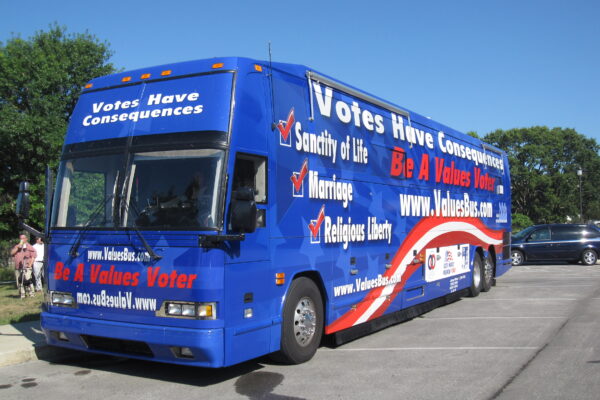This post originally appeared at Trans/missions, the USC Knight Chair in Media and Religion site.
With an important election looming, our constantly simmering political contest over “values” is once again at full boil.
Self-described “values voters” sparked furious debate following the 2004 exit polls. Liberals declared that God has no party. Conservatives saw a chance to cater to a collective yearning for morality in a world gone astray. The debate about what it actually means to be a “values voter” rages on, but new data from the Barna Group at least explains what the term doesn’t mean.
The Barna report describes the results of an open-ended survey asking Americans to identify the biggest contributions of Christianity to American society. The responses clustered around three main areas, in descending order of frequency: 1) helping/serving those in need, 2) evangelism, and 3) shaping or protecting morals and values.
While there are many rich nuggets to be mined from the report, one obvious highlight is the rift that responses 1) and 3) reveal in the prevailing American idea of “values”: helping the poor or serving the less-fortunate isn’t what most Americans mean when they talk about morality. Instead, talk of “moral values” almost always refers to traditional notions of sex, marriage and family as well as opposition to abortion.
Significantly, younger believers were more likely to cite traditional expressions of compassion and altruism as Christianity’s most important contributions to American culture. And they tended to line up with liberals and religious skeptics when it comes to not seeing the value in protecting what the older generation of Christians construes as “values.”
For the last few decades, conservative religious actors in the political arena have focused their efforts on promoting sexual mores rather than providing service to the downtrodden, a tactic which has diminished the moral authority of the institutions they represent in the eyes of many younger Christians. This trend is apparent in the Barna report as well as a recent Pew Forum study, which found that while many Americans look to their religious communities for guidance on sex-related issues, far fewer turn there for moral insight on issues related to immigration, the environment and poverty.
So what does this mean for reporters? The data from both Barna and Pew suggest growing inter-generational tensions around the issue of values and what it means to be religious. Will the rising generation of young believers find a home in existing denominations, form new spiritual movements or join the growing ranks of the religious “Nones”? Will they revive a social-justice oriented idea of “values”? What would that mean for current debates over sex, marriage and reproductive rights? The most important thing to realize from these surveys: your sources are out there, waiting for you to tackle these questions. Go get ’em!
Photo Credit: IowaPolitics.com/Flickr
Brie Loskota is the former executive director (2016-2021) of the USC Center for Religion and Civil Culture.







